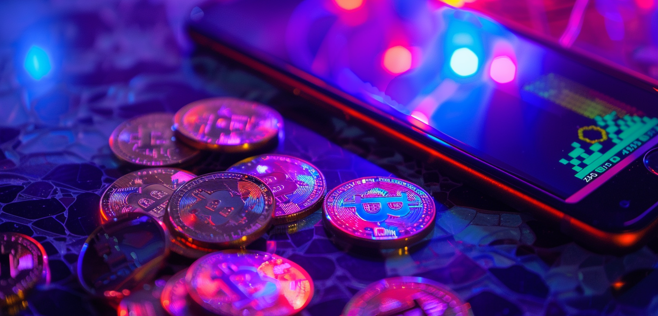Published 21 May 2024
The Convergence of Blockchain and Gaming: Play-to-Earn and the Metaverse

Blockchain technology, first introduced through Bitcoin in 2008, has since evolved into a transformative force with the potential to revolutionize various industries. By providing a decentralized, secure, and transparent ledger system, blockchain enables trust and efficiency in numerous applications, from finance and supply chain management to digital identity and voting systems.
One industry experiencing significant growth through blockchain integration is gaming. The global gaming market, already valued at billions of dollars, is embracing blockchain technology to create innovative gaming experiences, empower gamers, and unlock new economic opportunities. Two emerging trends in this space are play-to-earn gaming and the metaverse, which are reshaping the way we perceive and engage with digital entertainment.
In this article, we will explore the convergence of blockchain and gaming, focusing on the concepts of play-to-earn and the metaverse. We will delve into the unique value proposition these trends offer, discuss the benefits and challenges of integrating blockchain in gaming, and examine the potential future developments in this exciting space.

Understanding Play-to-Earn
Play-to-earn (P2E) is an innovative gaming model that allows players to earn real-world value, such as cryptocurrencies and non-fungible tokens (NFTs), by participating in and contributing to the game's ecosystem. This model disrupts the traditional gaming paradigm, where players often spend money on in-game purchases without the ability to recoup their investment or earn tangible rewards.
The unique value proposition of P2E gaming for gamers and developers lies in its ability to create a more equitable, engaging, and economically viable gaming experience. Gamers can now earn real-world value for their time, skills, and contributions, while developers can benefit from increased user engagement, retention, and the potential for new revenue streams.
Popular examples of P2E games and platforms include:
- Axie Infinity
A blockchain-based game where players collect, breed, and battle fantasy creatures called Axies. Players can earn the game's native cryptocurrency, Smooth Love Potion (SLP), and NFTs with real-world value.
- Decentraland
A virtual reality platform powered by the Ethereum blockchain, where users can create, explore, and monetize content and experiences. Players can buy, sell, and rent virtual land parcels in the form of NFTs, as well as earn the platform's native cryptocurrency, MANA.
- The Sandbox
A community-driven platform that allows users to create, share, and monetize gaming experiences using NFTs and the platform's native cryptocurrency, SAND.
The role of blockchain and NFTs in P2E gaming is crucial, as they enable the creation, verification, and transfer of unique digital assets with real-world value. Blockchain technology ensures the security, transparency, and decentralization of the game's ecosystem, while NFTs provide a means for gamers to truly own and trade their in-game assets, fostering a more dynamic and player-driven economy.

The Metaverse: A Virtual World Enabled by Blockchain
The metaverse is a collective virtual shared space, created by the convergence of virtually enhanced physical reality and physically persistent virtual reality. It is an immersive, interactive, and interconnected digital environment where users can engage in various activities, such as socializing, gaming, shopping, and working. The metaverse is often considered the next frontier in digital interaction, with the potential to revolutionize the way we live, work, and play.
Blockchain technology plays a crucial role in enabling the development of a decentralized, secure, and interoperable metaverse. By providing a robust infrastructure for digital asset creation, verification, and transfer, blockchain ensures that users can truly own and control their virtual possessions, from in-game items and virtual real estate to digital art and identity data.
Moreover, blockchain's decentralized nature promotes a more open and democratic metaverse, where users, developers, and content creators can collaborate, innovate, and share in the value they create. This is in stark contrast to the current centralized digital ecosystems, where platforms and corporations often wield disproportionate power and control over users and their data.
Examples of existing metaverse projects and platforms that leverage blockchain technology include:
- Decentraland
A virtual reality platform where users can create, explore, and monetize content and experiences. Decentraland's virtual world is divided into parcels of land, represented as NFTs, which users can buy, sell, and rent.
- The Sandbox
A community-driven platform that allows users to create, share, and monetize gaming experiences using NFTs and the platform's native cryptocurrency, SAND.
- Cryptovoxels
A virtual world built on the Ethereum blockchain, where users can buy, sell, and develop virtual land parcels, as well as interact with others in a fully decentralized and immersive environment.

Benefits of Blockchain Integration in Gaming
Blockchain integration in gaming brings numerous advantages that can significantly enhance the gaming experience for all stakeholders involved. Some of the key benefits include:
- True ownership
Blockchain enables gamers to truly own their in-game assets, such as items, collectibles, and virtual real estate, in the form of non-fungible tokens (NFTs). This ownership is verifiable, immutable, and independent of any centralized platform or authority, ensuring that gamers have full control over their digital possessions.
- Provable scarcity
Blockchain allows for the creation of truly scarce digital assets, as the total supply and distribution of NFTs can be programmatically enforced and transparently audited. This scarcity can create real-world value for in-game items and collectibles, as well as foster more dynamic and engaging game economies.
- Cross-platform compatibility
Blockchain-based assets can be designed to be interoperable across different games and platforms, enabling gamers to seamlessly transfer and utilize their digital possessions in various gaming environments. This interoperability can unlock new opportunities for collaboration, innovation, and user engagement in the gaming ecosystem.
- Decentralized governance
Blockchain enables the creation of decentralized autonomous organizations (DAOs) that can govern gaming platforms and communities in a transparent, democratic, and community-driven manner. This decentralized governance can empower gamers, developers, and content creators to have a direct say in the decision-making processes and value distribution of the gaming ecosystem.
- New revenue streams
Blockchain integration in gaming can unlock new revenue streams for gamers, developers, and content creators, such as play-to-earn models, NFT trading, and virtual real estate development. These opportunities can create more economically viable and sustainable gaming experiences, as well as foster a more equitable distribution of value among all stakeholders.
By leveraging these benefits, blockchain integration in gaming can empower gamers, developers, and content creators to create, share, and monetize innovative gaming experiences in a more open, transparent, and decentralized manner. This new paradigm has the potential to reshape the gaming industry and pave the way for a more immersive, engaging, and economically viable future.

Challenges and Limitations
Despite the numerous benefits of blockchain integration in gaming, there are also several challenges and limitations that need to be addressed to ensure the successful adoption and growth of this new paradigm. Some of these issues include:
- Scalability
Blockchain networks, particularly those based on proof-of-work (PoW) consensus mechanisms, can face scalability issues when processing a high volume of transactions. This can result in slow confirmation times and increased transaction fees, which can negatively impact the user experience in gaming environments that require fast and low-cost transactions.
- User experience
Blockchain-based gaming platforms and applications can be more complex and less intuitive for users who are not familiar with blockchain technology, cryptocurrencies, and NFTs. This learning curve can hinder the mass adoption of blockchain-based gaming experiences and limit their potential reach and impact.
- Regulatory concerns
The rapidly evolving and decentralized nature of blockchain technology can create regulatory challenges and uncertainties for gaming platforms and users. Issues such as taxation, consumer protection, and anti-money laundering (AML) compliance can pose potential risks and barriers to the growth and development of blockchain-based gaming.
- Interoperability
While blockchain enables the potential for cross-platform compatibility, achieving true interoperability between different blockchain networks, gaming platforms, and applications can be a complex and challenging task. This can limit the potential synergies and opportunities that can be unlocked by a more interconnected and integrated gaming ecosystem.
To address these challenges and limitations, several potential solutions and strategies can be considered:
- Scalability solutions
Implementing scalability solutions, such as layer-2 protocols, sidechains, and sharding, can help improve the transaction throughput and efficiency of blockchain networks, ensuring a smooth and seamless user experience in gaming environments.
- User-friendly onboarding and design
Developing user-friendly onboarding processes, educational resources, and application designs can help lower the entry barrier for users who are new to blockchain technology, facilitating the mass adoption of blockchain-based gaming experiences.
- Regulatory engagement and compliance
Actively engaging with regulators and ensuring compliance with relevant laws and regulations can help mitigate potential risks and uncertainties in the blockchain-based gaming ecosystem, fostering a more secure and stable environment for all stakeholders.
- Collaboration and standardization
Encouraging collaboration and standardization efforts among blockchain networks, gaming platforms, and application developers can help promote interoperability, innovation, and the development of a more integrated and thriving gaming ecosystem.
By tackling these challenges and limitations, the gaming industry can fully leverage the potential of blockchain technology to create more immersive, engaging, and economically viable gaming experiences for gamers, developers, and content creators alike.

The Future of Blockchain and Gaming
The convergence of blockchain and gaming is still in its early stages, but the potential for transformative change and innovation is immense. As the technology continues to mature and gain traction, several future developments and trends are likely to shape the gaming industry and the broader digital economy.
- Mainstream adoption
As blockchain technology becomes more scalable, user-friendly, and accessible, we can expect to see a growing number of mainstream gamers and developers embracing blockchain-based gaming experiences. This increased adoption can lead to the creation of new gaming genres, business models, and revenue streams, as well as foster a more diverse and inclusive gaming ecosystem.
- Virtual reality and augmented reality integration
The integration of virtual reality (VR) and augmented reality (AR) technologies with blockchain-based gaming platforms can create more immersive, interactive, and realistic gaming experiences. This convergence can also contribute to the development of the metaverse, enabling users to seamlessly navigate and interact with various virtual worlds and experiences.
- Esports and blockchain
The esports industry, which is already experiencing rapid growth, can benefit significantly from blockchain integration. Blockchain can enable secure and transparent player rankings, tournament management, and prize distribution, as well as facilitate the creation and trading of unique esports-related digital assets, such as team tokens, collectibles, and fan merchandise.
- Cross-industry collaboration
The convergence of blockchain and gaming can also foster collaboration and synergies with other industries, such as art, music, and entertainment. This interdisciplinary approach can lead to the creation of innovative and engaging experiences that transcend traditional industry boundaries and cater to a wider range of user preferences and interests.
- Decentralized finance (DeFi) and gaming
The integration of DeFi applications and services with blockchain-based gaming platforms can unlock new financial opportunities and use cases for gamers, developers, and content creators. This can include lending and borrowing of in-game assets, liquidity provision for gaming marketplaces, and the creation of novel gaming-related financial instruments.
As these trends and developments unfold, the convergence of blockchain and gaming is poised to have a significant impact on the gaming industry and the broader digital economy. By enabling true ownership, provable scarcity, and decentralized governance, blockchain can empower gamers, developers, and content creators to create, share, and monetize innovative gaming experiences in a more open, transparent, and equitable manner. This new paradigm can ultimately lead to a more immersive, engaging, and economically viable future for the gaming industry and its stakeholders.

Conclusion
The convergence of blockchain and gaming is set to revolutionize the gaming industry by introducing innovative concepts such as play-to-earn and the metaverse. Blockchain technology has the potential to empower gamers, developers, and content creators by providing true ownership, provable scarcity, and decentralized governance, ultimately leading to more immersive, engaging, and economically viable gaming experiences.
As the technology continues to evolve and gain traction, it is crucial for gaming enthusiasts, developers, and industry stakeholders to stay informed about the latest developments and innovations in blockchain gaming. By doing so, they can better understand the opportunities and challenges that lie ahead and actively participate in shaping the future of this exciting and rapidly evolving space.
As we look to the future, the integration of blockchain and gaming promises to create a more open, transparent, and equitable gaming ecosystem that caters to the diverse needs and interests of gamers, developers, and content creators alike.
Read More




 Get RateX Pro
Get RateX Pro

 25 Apr 2024
25 Apr 2024
